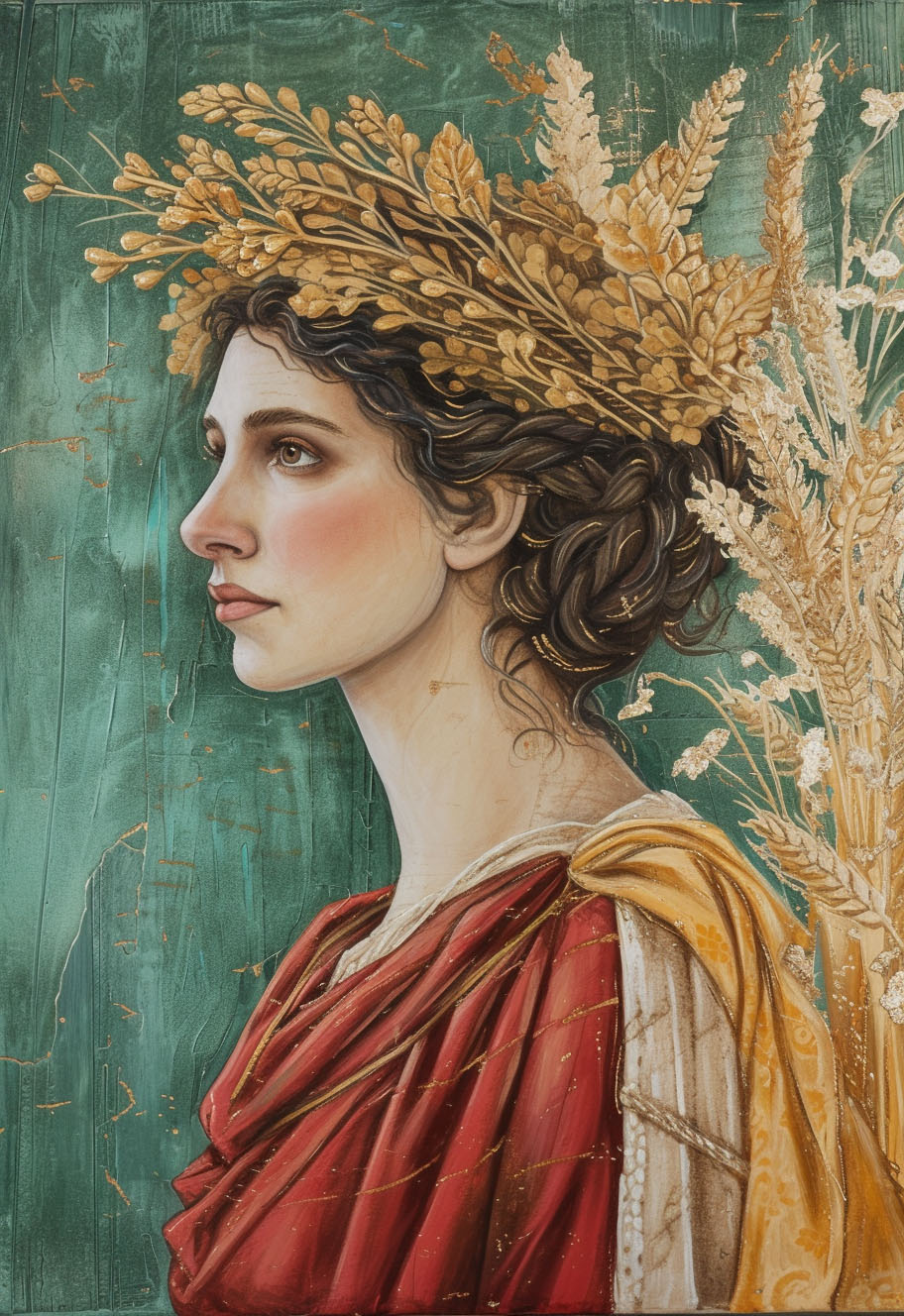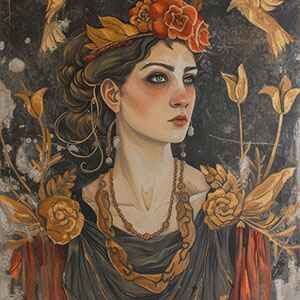
Parentage: Demeter is the daughter of Cronus and Rhea, making her a sibling to Zeus, Poseidon, Hades, Hera, and Hestia.
Goddess of Agriculture: Demeter's primary domain is agriculture and fertility. She is associated with the growth of crops, the harvest, and the abundance of the earth. Demeter is often depicted holding sheaves of wheat or barley.
Mother of Persephone: Demeter is the mother of Persephone, a central figure in Greek mythology. The myth of Demeter and Persephone explains the changing seasons. Hades abducts Persephone, leading to Demeter's grief and the barrenness of the earth during her daughter's absence. When Persephone is allowed to return, the earth flourishes once again.
Eleusinian Mysteries: Demeter is closely associated with the Eleusinian Mysteries, a religious and initiatory cult centered around her and the story of her search for Persephone. The mysteries were among the most important and secretive religious rituals in ancient Greece.
Symbols: Demeter is often depicted with symbols related to agriculture, such as sheaves of wheat, a sickle, and a cornucopia (horn of plenty). These symbols represent her role as a nurturing and life-giving goddess.
Search for Persephone: In her grief over Persephone's abduction, Demeter wandered the earth in search of her daughter. During this time, the earth became barren, and crops failed. This period is known as the "Demeter's Descent" or "Demeter in Mourning."
Deal with Hades: A compromise was eventually reached, allowing Persephone to spend part of the year in the Underworld with Hades and the other part with Demeter. This cycle corresponds to the changing seasons, with the barren winter symbolizing Persephone's absence.
Protector of Fertility: Demeter is invoked by farmers and those involved in agriculture to ensure a good harvest. Her blessings are sought to promote fertility and abundance in the land.
Titles and Epithets: Demeter is known by various titles and epithets, including "Mother of the Grain," "Bringer of Seasons," and "Giver of Gifts."
Cultural Impact: Demeter's mythology and cult had a profound influence on Greek religious practices and beliefs about the cycles of nature. The themes of loss, grief, and renewal in the Demeter and Persephone myth resonate in various cultural and artistic expressions.
Demeter's significance lies in her role as a benevolent goddess, providing for the agricultural well-being of the earth. Her story with Persephone reflects the cyclical nature of life, death, and rebirth, as seen in the changing seasons.
Immediate Family
Quick Facts
- Demeter is the goddess of agriculture, harvest, and fertility.
- She is one of the twelve Olympian deities.
- Demeter is the daughter of Cronus and Rhea.
- Her primary domain is agriculture and fertility.
- Demeter is the mother of Persephone.
- She is associated with the Eleusinian Mysteries.
- Demeter is often depicted with symbols related to agriculture.
- In her grief over Persephone's abduction, Demeter wandered the earth.
- A compromise with Hades allows Persephone to spend part of the year in the Underworld.
- Demeter is invoked to ensure a good harvest and promote fertility.
Further Reading
Art &
Architecture
Ancient Greek art and architecture, with its harmonious proportions and timeless elegance, continue to inspire awe and admiration millennia later.
Discover
Greek Mythology & Mythical Characters
Greek mythology, a rich tapestry of gods, heroes, and mythical creatures, captivates the imagination with its tales of love, betrayal, and epic adventures that delve into the depths of the human psyche.
Discover
Ancient Greek History
Ancient Greek history, marked by remarkable achievements in democracy, philosophy, and warfare, shaped the foundation of Western civilization, leaving an indelible legacy of innovation and cultural influence that continues to resonate to this day.
Discover
Ancient Greek Olympics
The ancient Greek Olympics, held in Olympia every four years, celebrated athleticism, unity, and cultural pride, serving as a testament to the enduring spirit of competition and excellence that transcends time and borders.
Discover
Ancient Greek Wars
Ancient Greek wars, such as the Persian Wars and the Peloponnesian War, were pivotal conflicts that shaped the course of history, highlighting the struggle for power, independence, and the clash of civilizations in the ancient Mediterranean world.
Discover
Ancient Greek Culture and Society
Ancient Greek culture and society, characterized by its emphasis on art, philosophy, and civic engagement, fostered a vibrant intellectual and social landscape where innovation flourished, democracy thrived, and the pursuit of knowledge and excellence was celebrated as fundamental values of civilized life.
Discover

